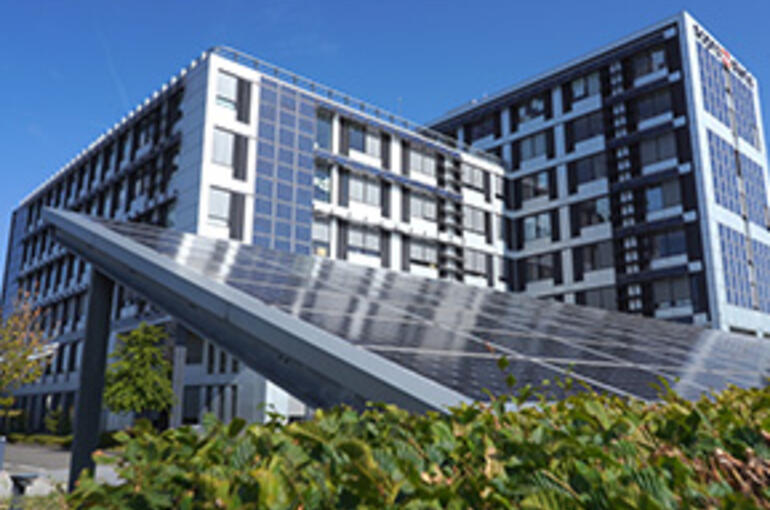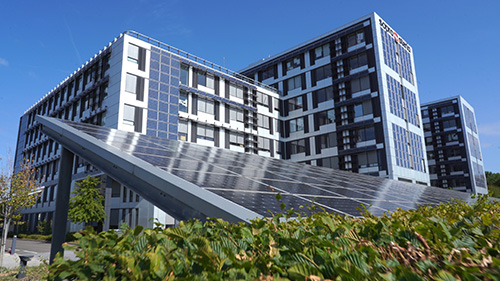
SCOR is a longstanding supporter of sustainability-led initiatives. Upholding Sustainable Development as one of its five core values, SCOR acknowledges the high relevance to its business of the Sustainable Development Goals (SDGs) set in 2015 by the United-Nations Agenda 2030.
SCOR is a longstanding supporter of sustainability-led initiatives, such as the United Nations Global Compact and the Principles for Sustainable Insurance. Upholding Sustainable Development as one of its five core values, SCOR acknowledges the high relevance to its business of the Sustainable Development Goals (SDGs) set in 2015 by the United-Nations Agenda 2030.
At SCOR, we believe that stakeholder value is every bit as important as shareholder value. We care about all of our stakeholders, and about society as a whole. Creating shared value and producing security are key elements of how we do business. The reinsurance industry in particular has a crucial role to play in economic and societal development. Through its fundamental function of mutualizing risk and its capacity to absorb negative shocks, reinsurance helps, ex-ante, to stimulate innovation, investment and development. Ex-post, reinsurance is there to help victims financially, to ensure that they have a replacement income, to help them to rebuild their homes, and to regain their autonomy.
Addressing the risks related to climate change
As a reinsurer, SCOR believes that Climate Change is a global threat, complex and systemic by nature.
Our Climate policy clearly demonstrates that, as an organization, we want to play our part in mitigating climate change and adapting to its consequences. We are accompanying the transition to a low-carbon economy through our underwriting and investment activities.
In the area of underwriting, we launched a specific initiative in 2018 on renewable energy underwriting. In addition, we firmly believe that reinsurance has a role to play in climate change adaptation, through the design of reinsurance solutions tailored to extreme weather events and through the harnessing of modeling capabilities on both sides of the balance sheet. In 2018, SCOR has thus supported the launch of a satellite Index Insurance for farmers in Ethiopia. We actively manage our global carbon footprint, having reduced our global carbon intensity by 25% at the end of 2018 (baseline: 2014). In 2017, following an enthusiastic global vote by staff, we also committed to a pilot carbon offset program, which was renewed and enhanced in 2018.
The Green Office in Meudon, the first "positive-energy" building in France
Supporting the knowledge society
SCOR has a longstanding tradition of corporate citizenship, aligning its global involvement with its business activities, its corporate values and its tagline, “The Art & Science of Risk”. Over the past few years, SCOR has committed more than EUR 13 million to the support of science, education and academic research through its Corporate Foundation for Science.
In 2018, we supported new research projects both directly and through the Foundation. As an illustration, together with the Paris School of Economics (PSE), the SCOR Corporate Foundation for Science created a chair on Macroeconomic Risk that aims to promote the development and dissemination of macroeconomic risk research. The SCOR Corporate Foundation for Science also co-organized an international conference on emerging infections & pandemic risk with the Institut Pasteur. The Group and its Foundation also contribute to the promotion of actuarial science by helping to fund actuarial awards in cooperation with local actuarial institutes in Europe (Germany, Spain, Portugal, France, Italy, the UK, Switzerland and Sweden) and Asia (Singapore).
In addition to the Actuarial Awards, since 2015 SCOR has also held an annual actuarial science symposium in Paris, in conjunction with the Institut des Actuaires (Institute of Actuaries). The themes of the past three symposiums have been “Statistical instability and model risk” (December 2018), “Will Artificial Intelligence revolutionize actuarial science?” (December 2017), and “Scientific laws and mathematical models: from physics to actuarial science” (December 2016).
SCOR also owns Humensis, a leading editor and publisher of pedagogical resources and scientific literature. This investment bears witness to our longstanding commitment to scientific research and literacy.
Supporting communities
Aside from its involvement in the development and diffusion of scientific knowledge, whether through its Corporate Foundation for Science or some of its investments, SCOR runs several sponsorship programs throughout the world that get its offices and teams involved in the life of the local population.
Steered locally to be as close as possible to the needs of the communities concerned, the Group’s employees strive to develop their own societal commitment programs, with due consideration for the specific cultural and/or regulatory features of the countries involved. For example, the Paris teams were particularly active in 2018 in terms of supporting circular economy initiatives. SCOR partnered with non-profit associations Rejoué and La Cravate Solidaire to organize charity collections of toys and clothes, while unsold food from the office canteen was redistributed to those in need by Le Chainon Manquant. Paris staff also renewed their annual support for Les Foulées de l’Assurance, a running event raising money for research into cardiovascular disease. In the U.S., the staff organizations “SEAC” (SCOR Employee Activity Committee) and “Esprit de Corps” worked alongside local NGOs and enabled staff to devote four hours of their time per month to the non-profit associations of their choice.
Voluntary carbon offset program
SCOR has reduced the carbon footprint of its direct operations by 25% per employee since 2004. Nevertheless, most of its CO2 emissions (more than 80%) stem from business air travel, which is difficult to reduce due to the Group’s worldwide activity. In 2017, SCOR decided to launch a forward-looking program designed to balance those remaining emissions. While pivotal, carbon offsetting is not the only goal of this program, which focuses on forest preservation through the purchase of carbon credits from two certified forest projects based in Zimbabwe (Kariba) and Peru (Madre de Dios).
Click on the image to read more about SCOR's carbon offset programs
in Zimbabwe’s and Peru’s forests
SCOR sees the role of the forest as being directly connected to its main business focus: contributing to the resilience of people and assets. The Group believes that forests have an essential role to play, not only as a “carbon sink” (capturing CO2 emissions), but also in strengthening the resilience of ecosystems and populations. By restoring degraded lands, forests can typically prevent or limit the devastating effects of natural disasters such as floods, storms, droughts, and rising sea levels. Moreover, responsible management of forest resources and sustainable agroforestry projects can contribute to the development of local communities (upskilling, poverty reduction, etc.). As part of this strategy, the Group more than doubled its offsetting in 2018 compared to the previous year, including almost 50% of its air travel emissions, i.e. 10,000 TeqCO2.

